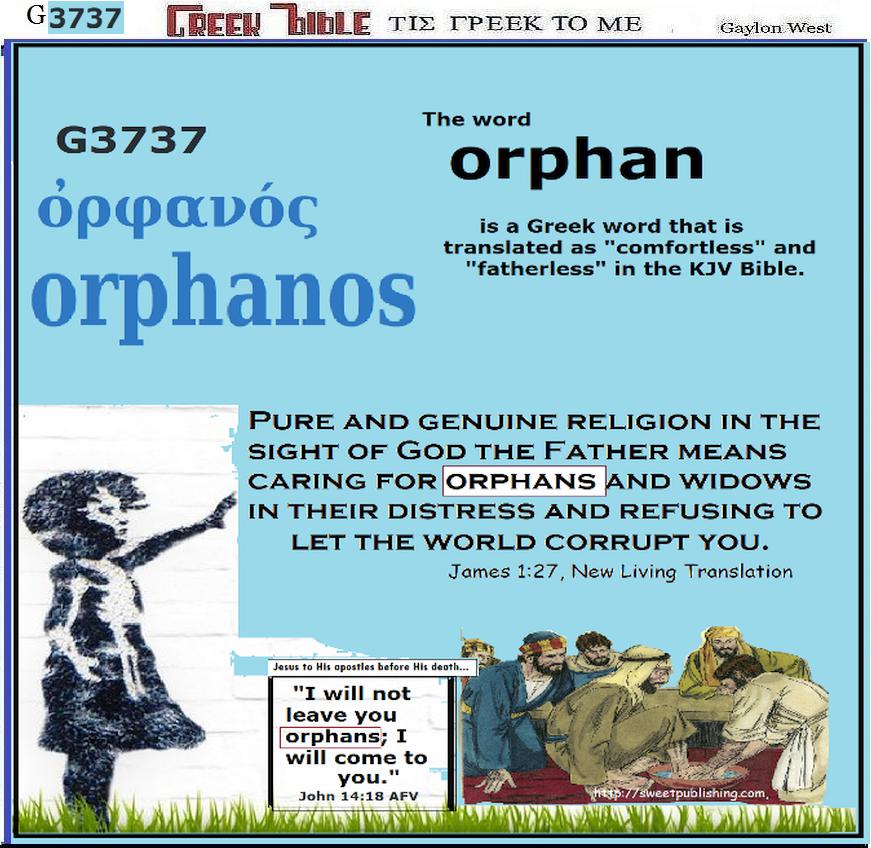
|
GREEK
WORDS IN ORIGINAL BIBLE TEXT FROM WHICH WE GET OUR ENGLISH.
posted as https://biblestudylessons.net/Comics/Greek%20to%20me/orphan.html- GW The Greek word orphanG3737 is found in only two places in the New Testament: John 14:18 and James 1:27. In the King James Version it is translated as (1) “comfortless” in John 14:18. Jesus to His apostles: “And I will pray the Father, and he shall give you another Comforter, that he may abide with you for ever; Even the Spirit of truth; whom the world cannot receive, because it seeth him not, neither knoweth him: but ye know him; for he dwelleth with you, and shall be in you. I will not leave you comfortless: I will come to you.” (John 14:16-18). We should accept that the gift the Holy Spirit in Acts 2:38 is also of God and of Jesus. That is, the gift is indeed of the Spirit but is also the gift of God the Father and the gift of the Lord Jesus. This we know because Jesus promised to His apostles in the upper room that the Father and He (Jesus) would be sending the Holy Spirit as another “comforter” specifically for them (the apostles) after His death (John 15:26).i The Spirit was to be the Comforter (Thayer’s Greek: paraclete—"a helper, succourer, aider, assistant”) to these “orphaned” apostles (John 14:18).ii The apostles were the only ones present when Jesus made this promise. They would shortly be losing the physical closeness of their Master Teacher and Companion at the time when their assignment would be to go into all the world; hence, they are described as “orphaned.”iii What is meant by “orphaned”? ὀρφανός G3737 orphanos Anglicized: orphan. Two Greek dictionaries: Thayer's Definition: 1) bereft (of a father, of parents) 1a) of those bereft of a teacher, guide, guardian 1b) orphaned Part of Speech: adjective Strong's Definition: Of uncertain affinity; bereaved (“orphan”), that is, parentless: - comfortless, fatherless. (2) “fatherless” is its translation in James 1:27. “fatherless” is in James 1:27 James 1:27 “Pure religion and undefiled before God and the Father is this, To visit the fatherless and widows in their affliction, and to keep himself unspotted from the world.” ETYMOLOGY OF THE ENGLISH WORD “ORPHAN”: https://www.etymonline.com/ orphan (n.) "a child bereaved of one or both parents, generally the latter," c. 1300, from Late Latin orphanus "parentless child" (source of Old French orfeno, orphenin, Italian orfano), from Greek orphanos "orphaned, without parents, fatherless," literally "deprived," from orphos "bereft.” NOTE ONLINE: “That the root of the word is Greek, and the affix English, is, I think, immaterial, because the word "orphan" is so thoroughly Anglicised that we are never thinking of [orphanos] when we use it. [Notes and Queries, Jan. 20, 1872] -etymoline.com The inspired writer James reminds us that real religion (“a binding back to God”iv) in our lives is not just the negative, i.e., to keep oneself morally free from sin in the world. We are also liable for good works (contrary to some religious teachers who say that God does not judge us by our good works). This reminds us that the gift of God's grace is unto our being “created unto good works” (Ephesians 2:8-10). The commentators on James note that giving donations to charity is good but is not sufficient for this definition of acceptable religion. Pure religion and undefiled before God is to “visit” that orphan and widow in their affliction. “To visit” according to Vincent's Word Studies is the “nobler charity which makes men familiar with the haunts of wretchedness, and follows the object of its care through all the phases of his life” (Lecky, “History of European Morals,” ii., 98). It references the abandoned child but also in John Jesus makes us realize that the fatherless can be adults who are hurting and forgotten by death of friends or abandonment of friendship.
i John 15:26, “But when the Comforter has come, which I will send to you from the Father, even the Spirit of the truth, which proceeds from the Father, that one shall bear witness of Me.” ii John 14:18, (ABP+) “I will not leave you orphans;G3737 I am coming to you.” (AFV) “I will not leave you orphans; I will come to you.” (CEV) “I won't leave you like orphans. I will come back to you.” (Darby) “I will not leave you orphans, I am coming to you.” iii https://biblestudylessons.net/articles/ACCEPTING.html |

